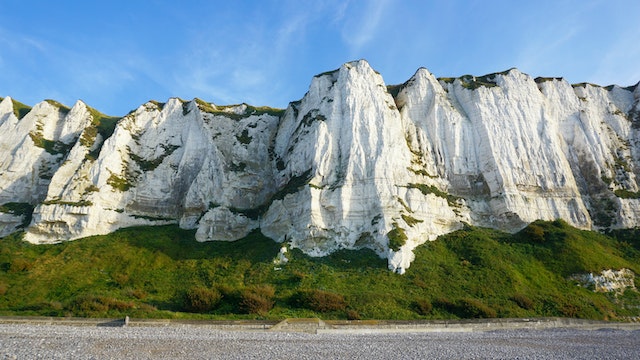Podcast 154 - Hattie Weatherspoon
Short story at B1 level
Story starts at 9:27

I don't remember exactly where I read this story for the first time. It may have been a book, or it may have been an English textbook for learning English! What I do remember is that the story took place on the White Cliffs of Dover.
This is a well known area of the South East of England. It is a high area like a hill, except a cliff means that the hill is vertical. There's a vertical drop down to the sea. And these cliffs are famous because they're made of chalk. Chalk is a type of rock. In fact, actually, you might be familiar with it. Because we use chalk to write on the blackboard or rather, teachers used to do that. Now perhaps we have smart boards.
Anyway, the story takes place on top of the White Cliffs of Dover and it's really is useful for B1 students who are looking for language to do with the countryside, sea, the sky and words connected to nature. So those are the words which I'll bring out in this story.
As I have just said, they are B1 words B1 vocabulary. And the story is called 'Hattie Weatherspoon'. So here we go...
As I have just said, I'm going to tell you some of the words connected to nature, which you can listen for in the story. As I just mentioned, there's the word cliff, which is a hill, which has a vertical drop down, usually to the sea. And we call those cliffs.
It's possible at the White Cliffs of Dover to walk very close to where the drop goes down, and that we call the edge of the cliff.
So words that we talk about when we have a very good view: scenery, and landscape, which are words with a similar meaning, scenery and landscape, which is what we can see when we look out as far as we can see, the hills, mountains, the sea or countryside in front of us.
Now many landscapes and scenery, when it's to do with the countryside, we can describe as peaceful, meaning very quiet, and we feel quietness inside us. And that is something we call peaceful, which is a B1 adjective.
We're going to talk about the weather. And the weather in this story is a clear day. This means there are no clouds in the sky, or very few. We talk about a rainy day when it's raining, and we're talking about showers as well. We use this word 'showers' to talk about rain which falls now and again for a short time. The same as like when you get into the shower to wash yourself. We call those showers.
We've got the word rock. I mentioned that word because the cliff is made of this white rock called chalk.
So anyway, in our story, we've got a clear day. It's a cloudless sky. Cloudless, which I've put in there. It's not a B1 word, but it's useful to know how we use that suffix, LESS. So if something is cloudless, it means it doesn't have any clouds, the blue sky in other words.
Then another thing is when we're describing scenery or landscape and it goes up and down. We say that,
The land rises up.
So a hill, for example,
rises up to the sky.
On this clear day, in the cloudless sky, we've got a gentle breeze, which is a very light wind. Usually something that we enjoy -
A gentle breeze.
And then we have the term fresh air, which is a B1 expression. Remember that 'fresh' in English doesn't really mean 'cold'. It means something which is not bad. Like for example, if you say fresh fruit, that means fruit, which is straight from the tree, and it's good to eat. Not, for example, like a banana, which has gone brown or black. It's not fresh. So that's usually the meaning of fresh in English.
So fresh air means really clean air. Not bad, not for example, like in a city where there's a lot of pollution. Then we have a geographical structure, a bay, which is a semi-circular form, where the beach goes round in a semi-circle like that and the sea goes in and we call that 'a bay'.
The final one, talking about nature is butterflies. Butterflies, which is a B1 word, I found out, which are those little insects, which we all love, because they have very brightly-coloured wings. And they fly over the grass and flowers. And they're something that we all enjoy when we go out into the countryside - butterflies.
Okay, so that's the vocabulary. Listen for those words, as I read through.
Perhaps you can also think, as well, about the sort of person that this man meets while he's walking along the path on the edge of the cliff. Can you identify with the actions of this woman he meets.
In this story, I also include language and a way to talk about hypothetical situations. I do this because it's important when you're doing the B1 exam, for example, like the speaking - the picture. Or in part four of the speaking exam, where you may need to speculate; to say things that you don't know but you imagine, or you say ''perhaps'.
Listen for that language in the story, how I express these hypothetical ideas.
So here we go...
[The story starts...]
The audio script of the story is not included here.
Copyright © 2023 Practising English
All rights reserved